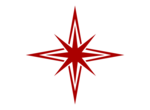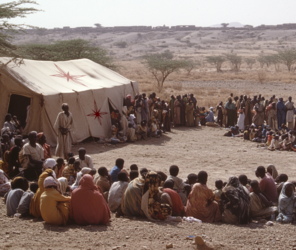Sturm-Rubinus Foundation: Difference between revisions
No edit summary |
m (Add wiki-links) |
||
| (14 intermediate revisions by 2 users not shown) | |||
| Line 1: | Line 1: | ||
== Humanitarian | {{NGO | ||
| NGO name = Sturm-Rubinus Foundation | |||
| NGO native name = SRF | |||
| logo link = | |||
| flag link = | |||
| logo = SRF_logo.png | |||
| flag = SRF_flag.png | |||
| Motto = ''"In hora obscurissima, omnibus in necessitate servientes."'' - ''"In the bleakest hour, Serving all in need"'' | |||
| Headquarters = [[Cedelphia]], [[Auresia]] | |||
| Official languages = [[Auresian language|Auresian]], [[Livarian language|Livarian]], [[Hellish language|Hellish]] | |||
| Leader = Dr. Titus Cornelius Scipio | |||
| Main focus = Humanitarian aid | |||
| Key people = [[Bernhard Sturm]] | |||
| Founded = Thrimil 12, 7632 | |||
| Founders = [[Bernhard Sturm]] | |||
| Activities = Provides humanitarian relief and and emergency healthcare in conflict zones | |||
| Funding = Donations, Grants, Partnerships with international organizations | |||
| Goals = | |||
| Organization Type = Non-governmental, Non-profit | |||
| Website = | |||
| Map of Activities = | |||
}} | |||
The '''Sturm-Rubinus Foundation''' is a non-profit, {{wp|non-governmental organization}} (NGO) focused on providing humanitarian relief and and emergency healthcare in conflict zones. Its operations focus is disaster and conflict zones, where it provides humanitarian aid in food, potable water and medical assistance to those in need. The organisation has numerous offices globally, and [[International Council of Nations]] (ICoN) protects it as a neutral NGO; the organisation does not take sides and renders aid to all that need it. The foundation can be recognised in the field by its red symbol featuring a star nested inside a fiery sun, representing [[Astronomy|Alir]] and [[Astronomy|Tyr]], who benevolently shine upon all. | |||
== | == History == | ||
Bernhard Sturm | The Sturm-Rubinus Foundation was founded as a result of the lived experiences of its founder, [[Bernhard Sturm]], and the outbreak of the First Coalition War. The foundation is named after himself and the surname of his [[Auresia]]n foster parents, whom he wanted to honour. The Rubinus helped Bernhard overcome years of suffering during internment during the [[Wolgos Scourge]] and grow up in a loving home, he also wanted to honour his own biological parents, who he dearly loved and lost during the war. | ||
During the [[First Coalition War]], the foundation received massive donations from [[Anaria]]ns, which it used to bring food and water to millions of displaced humans and to tend and care for wounded human soldiers and [[Wolgos]] POWs. | |||
Since then, the foundation has been an ever-present presence in all conflicts, ready to provide assistance without bias or profit. | |||
== Humanitarian Work == | |||
[[File:Uiiyy.png|left|thumb|296x296px|Sturm-Rubinus vaccination clinic in remote [[Tharna]]]] | |||
'''Emergency Relief in Conflict Zones''' | |||
* Distributing food and clean water to displaced populations, providing emergency rations to stave off famine and supporting those malnourished. | |||
* Establishing temporary shelters for refugees, such as providing tents, safe, neutral locations to safeguard against danger and essentials such as blankets. | |||
* Provide emergency care to those injured during conflicts and bolster surviving health care services. | |||
'''Emergency Healthcare''' | |||
* Setting up emergency clinics and field hospitals in disaster or conflict zones to help civilians and military personnel who have fallen in combat and who have no recourse. | |||
* Offering life-saving surgeries, medical treatment, and vaccinations to populations in dire need. | |||
* Providing mental health support for trauma victims during and after conflict. | |||
'''Crisis Preparedness and Response''' | |||
* Training local volunteers and responders to handle natural and man-made emergencies. | |||
* Collaborating with governments and NGOs for rapid deployment. | |||
'''Advocacy for Neutrality and Humanitarian Principles''' | |||
* Ensure that the SRF remains apolitical and neutral and that as many nations as possible allow it to operate regardless of ideology or political interests. | |||
* Promoting international humanitarian law and the protection of aid workers in conflict zones. | |||
== Funding == | |||
[[Category: Non-governmental organizations]] | |||
Latest revision as of 04:41, 30 December 2024
| Sturm-Rubinus Foundation SRF | |
| Logo | Flag |
|---|---|

|

|
| Motto: "In hora obscurissima, omnibus in necessitate servientes." - "In the bleakest hour, Serving all in need" | |
| Headquarters | |
| Cedelphia, Auresia | |
| Official languages | Auresian, Livarian, Hellish |
| Leader(s) | Dr. Titus Cornelius Scipio |
| Main focus | Humanitarian aid |
| Key people | Bernhard Sturm |
| Founding | |
| Founded | Thrimil 12, 7632 |
| Founders | Bernhard Sturm |
| Activities | |
| Provides humanitarian relief and and emergency healthcare in conflict zones | |
| Funding | |
| Donations, Grants, Partnerships with international organizations | |
| Goals | |
| Type of Organization | |
| Non-governmental, Non-profit | |
| Website | |
| Map of Activities | |
| [[File:|300px]] | |
The Sturm-Rubinus Foundation is a non-profit, non-governmental organization (NGO) focused on providing humanitarian relief and and emergency healthcare in conflict zones. Its operations focus is disaster and conflict zones, where it provides humanitarian aid in food, potable water and medical assistance to those in need. The organisation has numerous offices globally, and International Council of Nations (ICoN) protects it as a neutral NGO; the organisation does not take sides and renders aid to all that need it. The foundation can be recognised in the field by its red symbol featuring a star nested inside a fiery sun, representing Alir and Tyr, who benevolently shine upon all.
History
The Sturm-Rubinus Foundation was founded as a result of the lived experiences of its founder, Bernhard Sturm, and the outbreak of the First Coalition War. The foundation is named after himself and the surname of his Auresian foster parents, whom he wanted to honour. The Rubinus helped Bernhard overcome years of suffering during internment during the Wolgos Scourge and grow up in a loving home, he also wanted to honour his own biological parents, who he dearly loved and lost during the war.
During the First Coalition War, the foundation received massive donations from Anarians, which it used to bring food and water to millions of displaced humans and to tend and care for wounded human soldiers and Wolgos POWs.
Since then, the foundation has been an ever-present presence in all conflicts, ready to provide assistance without bias or profit.
Humanitarian Work

Emergency Relief in Conflict Zones
- Distributing food and clean water to displaced populations, providing emergency rations to stave off famine and supporting those malnourished.
- Establishing temporary shelters for refugees, such as providing tents, safe, neutral locations to safeguard against danger and essentials such as blankets.
- Provide emergency care to those injured during conflicts and bolster surviving health care services.
Emergency Healthcare
- Setting up emergency clinics and field hospitals in disaster or conflict zones to help civilians and military personnel who have fallen in combat and who have no recourse.
- Offering life-saving surgeries, medical treatment, and vaccinations to populations in dire need.
- Providing mental health support for trauma victims during and after conflict.
Crisis Preparedness and Response
- Training local volunteers and responders to handle natural and man-made emergencies.
- Collaborating with governments and NGOs for rapid deployment.
Advocacy for Neutrality and Humanitarian Principles
- Ensure that the SRF remains apolitical and neutral and that as many nations as possible allow it to operate regardless of ideology or political interests.
- Promoting international humanitarian law and the protection of aid workers in conflict zones.